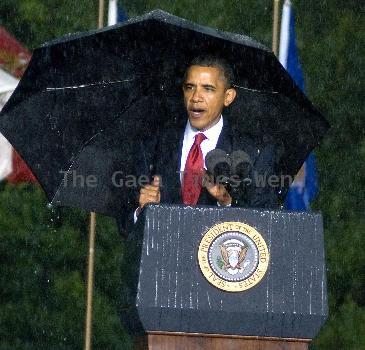Al-Maliki predicts divided Iraq if his critics replace him with a weak prime minister
By APMonday, August 2, 2010
Iraq’s PM warns his critics want a weak leader
BAGHDAD — Iraq’s embattled prime minister says his critics want a weak leader for the nation, which would break up and descend into sectarianism if they have their way.
Shiite prime minister Nouri al-Maliki says he is an easy target for criticism because he uses blunt words when discussing threats to Iraq’s people or institutions.
His comments were aired on state-run television Monday just hours after President Barack Obama reaffirmed plans to remove all by 50,000 U.S. troops from Iraq by the end of the month.
Al-Maliki’s chances of leading Iraq’s next government have been thrown in doubt by the refusal of his Shiite allies to back him for another term in office.
THIS IS A BREAKING NEWS UPDATE. Check back soon for further information. AP’s earlier story is below.
BAGHDAD (AP) — Bombings and drive-by shootings killed 12 people Monday, a reminder of Iraq’s ongoing instability as President Barack Obama cited progress amid the looming end of U.S. military operations in the country.
The latest violence and government figures showing that July was the deadliest month for Iraqis in more than two years revived persistent questions about the readiness by Iraqi security forces to take over from the Americans as the U.S. military draws down its forces and ends all combat operations at the end of the month.
They also confirm the widely spread belief that insurgents are taking advantage of a political impasse over forming a new government after a March 7 parliamentary election failed to produce a clear winner.
“But make no mistake: Our commitment in Iraq is changing, from a military effort led by our troops to a civilian effort led by our diplomats,” Obama said his Monday speech to disabled veterans in Atlanta.
The U.S. has repeatedly insisted Iraq is stable enough to proceed with the troop drawdown on schedule and violence has dramatically declined in Iraq since 2008. But attacks remain a daily occurrence, especially in Baghdad.
The U.S. plans to draw its forces in Iraq down to 50,000 by the end of this month and the last American soldier will leave by the end of next year. There are about 65,000 U.S. troops currently in Iraq.
In the worst incident Monday, suspected al-Qaida militants blew up the house of a policeman west of Baghdad and killed him, his wife and 4-year-old daughter.
The policeman’s house in Karmah, near the western city of Fallujah, was destroyed in the pre-dawn hours while the family was sleeping, police and hospital officials said.
Seven other family members, including four of the policeman’s sons, were wounded in the blast, the officials said, speaking on condition of anonymity because they were not authorized to talk to the media.
The police officials said they suspected al-Qaida militants were behind the attack. The militants have been targeting policemen and members of anti-al-Qaida Sunni militias, putting more pressure on the increasingly fragile security situation.
Separate attacks in Baghdad, including one targeting police, killed five more and wounded 15.
Police officials said a roadside bomb apparently aimed at a police patrol missed and killed three civilians traveling in a car and wounded eight bystanders in the western part of Baghdad.
Shortly after midnight, police and hospital officials said gunmen in a car opened fire at a cafe in Baghdad’s Shiite district of Sadr City, killing two people and wounding seven.
Residents said the attack may have been the work of vigilantes angered by suspected drug use at the cafe.
All the officials spoke on condition of anonymity because they were not authorized to speak to the media.
Around Mosul, a former insurgency hotbed located 225 miles (360 kilometers) northwest of Baghdad, a series of bombings killed three people and a fourth died in a marketplace shooting in the city center.
One of the roadside bombs killed an Iraqi army officer, according to local police. The other killed two people driving in the town of Qayarra, police and morgue officials said.
Figures released by Iraqi authorities over the weekend showed that July was the deadliest month for Iraqis — 535 killed — since May 2008 when 563 were killed.
The figures, dismissed by the U.S. military as too high, deepened concerns over Iraq’s precarious security even as the political deadlock persists and the United States continues to draw down on its forces.
Tags: Baghdad, Barack Obama, Bombings, Improvised Explosives, Iraq, Middle East, Militant Groups, Ml-iraq, North America, Religious Issues, United States

